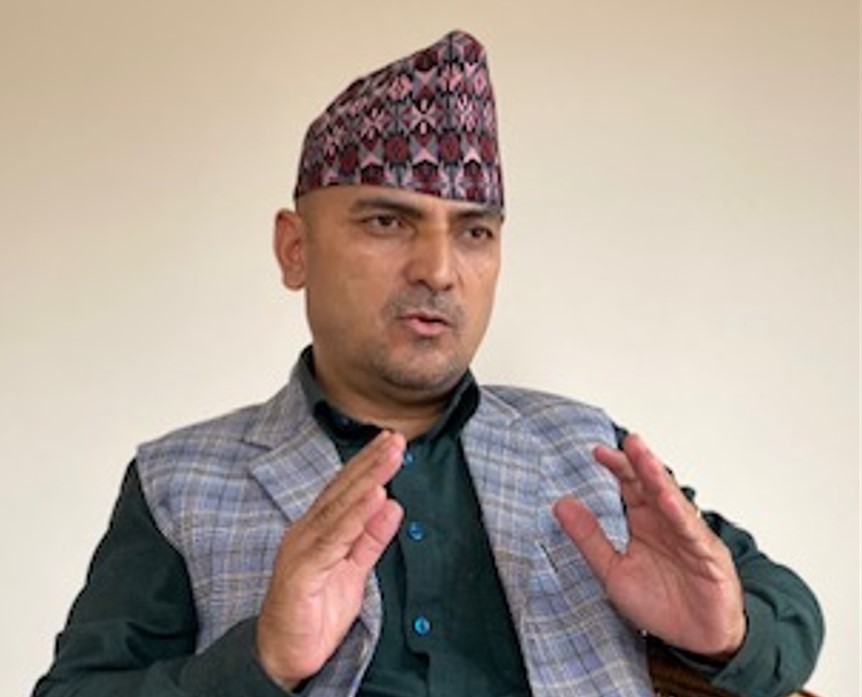Money & Finance

Gajendra Bista, PhD, is a seasoned journalist-economist with extensive knowledge on Nepal’s economy. He worked closely with former finance minister Ram Sharan Mahat, PhD, a key architect of Nepal’s post-1990 transition to free market economy. Bista served as a media adviser to Mahat and is well-informed about the functioning of the finance ministry and line agencies, including the donor community and the private sector. Since 2017, he has served as a board director of Prime Commercial Bank Ltd., specialising in banking, finance, and capital markets. NepalMinute.com spoke to Bista on the country’s latest situation. Excerpts:
How would you assess the country's current situation as an economist?
Poor governance, lack of rule of law, and widespread corruption, particularly in the years following the uprising of 2006, have not improved; instead, they have become more pervasive. Meritocracy is suppressed by the governmental apparatus. After the Covid-19 and the war between Russia and Ukraine, the country entered a recession that significantly worsened it. As a result, the level of unemployment, sense of hopelessness, and desperation among the populace in Nepal has reached an all-time high.
Instead of taking action to address these pressing challenges, those in positions of authority make impressive declarations to influence the populace, such as building the North-South (Kerung-Kathmandu) Railway or luring US$46 billion in foreign investment for hydropower. People are losing faith in the directionless and ineffectual leadership, which is encouraging the young and energetic to leave the country as soon as possible. In reality, political leaders have lost all credibility, and no one gives them any benefit of the doubt, let alone believing them or their promises. This is a serious sign that has to be carefully considered, particularly by political party leaders.
Why do you think the Provincial system is infeasible and why is it so highly criticised?
After eight years of execution, we haven't been able to make our federalism – a major constitutional reform and state restructuring agenda – functional and feasible. The three tiers of government have enormous administrative expenses, and paying for the administration and remuneration of more than 37,000 elected representatives of the people appears to be nearly impossible. The federal government's normal expenses have outnumbered the revenues for the first time in 55 years. The same is the situation of the provincial governments. The amount borrowed for this purpose from both internal and external sources roughly tripled once the new constitution went into effect.
In 1992, Nepal borrowed a total of Rs36.9 billion. The overall loan obligation of Nepal was Rs545 billion in 2015, the year that the federal system was put into place. The latest government data showed that Nepal's total outstanding debt in 2023 is Rs2309 billion, more than 40 per cent of GDP. This is a more than threefold increase in the amount that is not borrowed to fund infrastructure development or other development initiatives in Nepal but is instead used to pay for the operating expenses and salaries of elected people's representatives. In contrast, the federal or provincial government's ability to mobilise revenue has not improved. Thus, a number of experts from diverse fields are raising their concerns about its sustainability.
Following the implementation of the new constitution, the country should focus on economic development. However, the situation is exactly the opposite. Why, in your opinion, is the economy deteriorating further?
The prime minister should be in charge of fostering economic growth as a superpower by giving the economic agenda first priority and making use of all available domestic and international resources. If the prime minister has a vision for economic development and is committed to it, he should move through with initiatives and further economic reform to address the challenges that the private sector and investors have brought up. Despite feeling insecure about his past wrongdoings, he is less engaged in economic matters since he lacks a clear vision of the country's economic agenda and instead tries to hold onto power at the cost of the economy. The consequence is that the economy is facing a serious crisis. This is the fundamental reason why the nation is having trouble moving forward.
As you stated, the economy has underperformed in recent years; who else is to blame than the Prime Minister? Who is responsible for the latest worst situation in the country?
The main economic indicators showed that there is mismanagement both in the monetary and fiscal sectors. There is a general perception that the economy experienced a recent recession. Since the country has had credit-related issues, including sometimes overexpansion of credit and sometimes a credit crunch, the monetary policy is absolutely to blame. The nation's central bank should investigate this matter and review its previous policies and strategies.
Not that the government cannot help to stimulate the economy. The private sector has escalated its requests for changes to over 40 trade and investment-related legislations and regulations. Furthermore, the government must play a critical role in enacting long-overdue policy reforms. One area where the government and bureaucracy's outdated thinking needs to be relevant in contrast to other nations is the proper coordination between ministries, particularly the Ministry of Finance and the Nepal Rastra Bank.
As we discuss the Nepalese economy, the liquidity crisis was a past issue, and as a result of the availability of loanable funds, activities have not expanded as projected. Why?
Due to the strict monetary policy implemented by Nepal Rastra Bank (NRB), the country's central bank, economic activity has been declining for the past three years. The NRB implemented an excessively loose monetary policy during COVID-19 and then stood by a more restrictive policy on credit expansion. The Nepal Rastra Bank's rigid and restrictive policies have had a significant impact on exports, imports, small and medium-sized firms, and the stock market. So, loans were increased by only about 4 per cent after the NRB's strict policy stance, even though it had set a target of nearly 12 per cent for the most recent fiscal year.
Loan growth was approximately 27 per cent in COVID-19, thanks to the central bank's flexible monetary policies. Following that, the NRB implemented working capital guidelines to the banks and financial institutions without engaging larger stakeholders including the private sector, which are extremely difficult to implement at the moment. It discouraged loan demand from the private sector. As a result, despite adequate liquidity, the loan has not been claimed. It is critical that a realistic size of loan expansion creates assets and generates employment, providing government revenue and making banks and financial institutions good repayments. Furthermore, no one seems to be noting that direct lending will be a serious issue in Nepal, despite the fact that it has previously been tested and failed in China.
Do you see the economic situation of the country improve in the near future?
The economy has already suffered significant damage. I believe there is less risk of future economic deterioration. As the external sector has improved as a result of the increased inflow of remittances and the reduction in imports, the economy has begun to heal now. Land and contractor payments are other issues that the government has addressed. However, the damage has already been done by post-COVID impacts and conflict in Ukraine and Russia, as well as the Nepal Rastra Bank's then-unnecessarily strict measures. Other economic indicators need some time to improve and will take a little longer. Information obtained from many sources on rising loan demand and loan approvals and disbursements in recent weeks indicates that economic activity will expand in the coming days.
What suggestions do you have for improving the economy with immediate effect?
There are issues that must be addressed. The conflict between the Ministry of Finance and the central bank, the NRB, must be resolved, and the relationship between these organisations must be cordial. The central bank must remain autonomous, but its decisions must be professional and free of the interests of any political interest group or party. The land problem has been settled, but it still needs to be implemented at lower-level government entities. Contractor issues must be resolved, and contractors' payments must be made when the running bill is submitted.
As far as the various practical difficulties while dealing with the central bank as expressed by the private sector and financial institutions regarding working capital guidelines are concerned, that must be resolved immediately, and consistency in supplying liquidity in the market must be ensured. Certain difficulties of competition among banks and financial institutions must be addressed in order to create a level playing field. In this regard, the Nepal Bankers' Association should not be utilized as an instrument of interest rate cartel, as it was repeatedly accused of doing in the past.
When it comes to the stock market, issues must be addressed because the market has already fallen by over 60 per cent. It is advised that instead of using micromanagement of the capital market, the central bank should not go above its limit to the risk of loans provided by the banks and financial institutions. Besides, some policies should encourage small and medium-sized businesses since they contribute to the economy and create jobs. As economic activity is more dependent on credit expansion, a favorable climate should be created to allow for the extension of nearly 12 per cent of loans, which was the target set by the Nepal Rastra Bank itself for the current fiscal.
As you worked closely with Dr Ram Sharan Mahat in the Ministry of Finance, how do you compare him to other finance ministers, especially his younger brother Mahat?
There is a significant difference between Ram Sharan Mahat and past finance ministers in terms of appropriately handling the ministry and managing the economy as a whole. Dr. Mahat deserves credit for transforming Nepal's economy from centralised to market-oriented, with substantial reforms in all sectors of the economy that spared Nepal from a decade of armed conflict and political instability. He was a towering figure with an acceptable character in various nooks and corners of politics and government apparatus, with in-depth knowledge of the economy and politics. If he were in charge of the finance ministry now, Nepal would not be in such a severe economic condition.
Also Read: Meet four folks helping to run the engine of Nepal's gig economy
Also Read: The cannabis panacea for ailing people and economy of Nepal






